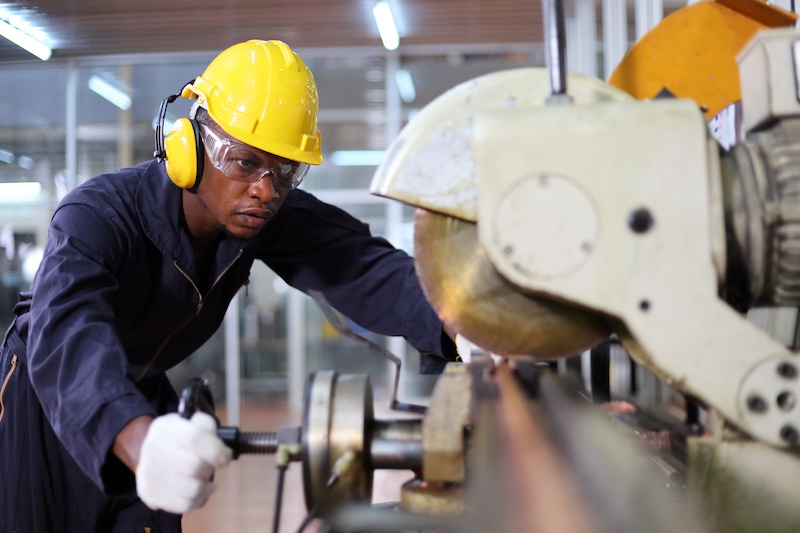Checklist: Behavior-based Safety Template
6 minutes, 13 seconds read

BEHAVIOR-BASED SAFETY CHECKLIST TEMPLATE
At-Risk BARRIERs
- Training Issue, Unfamiliar – never trained, unqualified, too long since training, unusual task.
- Management Pressure / System – time constraints, hurry, priority, poor job coordination.
- Apathy, Insignificant – don’t care, unimportant.
- Facility and Equipment Condition – design, modification or deterioration contributing to at-risk condition or behavior.
- Disagreement on At-Risk Practices – cannot agree that an at-risk condition or behavior exists.
- Personal Factors or Distractions – not thinking, mind not on the task at hand, preoccupied, self imposed pressure.
- Accepted Culture or Peer Pressure – doing the wrong thing because our peers do, going along with the crowd, rather not “rock the boat”.
- Environment Related – affected by weather, insects, wildlife.
Critical Behavior Elements
1.0 PPE
1.1 • Eye & Face Protection – wearing proper eye and face protection for the task (glasses, face shield, goggles).
Safe | At Risk | N/A
At-Risk BARRIER
- None
- Training Issue, Unfamiliar
- Management Pressure / System
- Apathy, Insignificant
- Facility & Equipment Condition
- Disagreement on At-Risk Practices
- Personal Factors or Distractions
- Accepted Culture / Peer Pressure
- Environment Related
1.2 • Hand Protection – proper gloves (high voltage gloves, rubber gloves, gallant style).
Safe | At Risk | N/A
At-Risk BARRIER
- None
- Training Issue, Unfamiliar
- Management Pressure / System
- Apathy, Insignificant
- Facility & Equipment Condition
- Disagreement on At-Risk Practices
- Personal Factors or Distractions
- Accepted Culture / Peer Pressure
- Environment Related
1.3 • Body Protection – proper protective clothing (acid suit, steam suit, rubber apron) including seat belts.
Safe | At Risk | N/A
At-Risk BARRIER
- None
- Training Issue, Unfamiliar
- Management Pressure / System
- Apathy, Insignificant
- Facility & Equipment Condition
- Disagreement on At-Risk Practices
- Personal Factors or Distractions
- Accepted Culture / Peer Pressure
- Environment Related
1.4 • Foot Protection – proper foot protection (safety shoes, boots).
Safe | At Risk | N/A
At-Risk BARRIER
- None
- Training Issue, Unfamiliar
- Management Pressure / System
- Apathy, Insignificant
- Facility & Equipment Condition
- Disagreement on At-Risk Practices
- Personal Factors or Distractions
- Accepted Culture / Peer Pressure
- Environment Related
1.5 • Fall Protection – properly protected from falling when working where this hazard exits (safety harness, body harness, tie-offs).
Safe | At Risk | N/A
At-Risk BARRIER
YesNoN/A
1.6 • Hearing Protection – wearing proper hearing protection where the hazard exists (ear plugs, ear muffs).
Safe | At Risk | N/A
At-Risk BARRIER
YesNoN/A
1.7 • Head Protection – hard hat worn appropriately where hazard exists.
Safe | At Risk | N/A
At-Risk BARRIER
- None
- Training Issue, Unfamiliar
- Management Pressure / System
- Apathy, Insignificant
- Facility & Equipment Condition
- Disagreement on At-Risk Practices
- Personal Factors or Distractions
- Accepted Culture / Peer Pressure
- Environment Related
2.0 BODY USE and POSITION
2.1 • Line of Fire – worker is positioning his body to avoid injury by any moving hazards (reflected arcs, escaping steam, falling objects).
Safe | At Risk | N/A
At-Risk BARRIER
- None
- Training Issue, Unfamiliar
- Management Pressure / System
- Apathy, Insignificant
- Facility & Equipment Condition
- Disagreement on At-Risk Practices
- Personal Factors or Distractions
- Accepted Culture / Peer Pressure
- Environment Related
2.2 • Lifting – proper lifting techniques (using legs, back straight, weight close to body, feet flat on floor, knees bent).
Safe | At Risk | N/A
At-Risk BARRIER
- None
- Training Issue, Unfamiliar
- Management Pressure / System
- Apathy, Insignificant
- Facility & Equipment Condition
- Disagreement on At-Risk Practices
- Personal Factors or Distractions
- Accepted Culture / Peer Pressure
- Environment Related
2.3 • Pinch Point – aware of and avoid pinch points (pinch points blocked, maintaining body parts out of pinch points).
Safe | At Risk | N/A
At-Risk BARRIER
- None
- Training Issue, Unfamiliar
- Management Pressure / System
- Apathy, Insignificant
- Facility & Equipment Condition
- Disagreement on At-Risk Practices
- Personal Factors or Distractions
- Accepted Culture / Peer Pressure
- Environment Related
2.4 • Awkward Position – proper body mechanics (over-extended, using legs not back when pulling).
Safe | At Risk | N/A
At-Risk BARRIER
- None
- Training Issue, Unfamiliar
- Management Pressure / System
- Apathy, Insignificant
- Facility & Equipment Condition
- Disagreement on At-Risk Practices
- Personal Factors or Distractions
- Accepted Culture / Peer Pressure
- Environment Related
3.0 TOOLS and EQUIPMENT
3.1 • Tool Use / Selection – using the right tool for the job and using it properly (correct style wrench, opening only one drawer at time).
Safe | At Risk | N/A
At-Risk BARRIER
- None
- Training Issue, Unfamiliar
- Management Pressure / System
- Apathy, Insignificant
- Facility & Equipment Condition
- Disagreement on At-Risk Practices
- Personal Factors or Distractions
- Accepted Culture / Peer Pressure
- Environment Related
3.2 • Condition – tools, even if correct for the job, must be in good condition (electrical cords properly insulated).
Safe | At Risk | N/A
At-Risk BARRIER
- None
- Training Issue, Unfamiliar
- Management Pressure / System
- Apathy, Insignificant
- Facility & Equipment Condition
- Disagreement on At-Risk Practices
- Personal Factors or Distractions
- Accepted Culture / Peer Pressure
- Environment Related
3.3 • Position Parked – vehicle is left in the position which creates the least possibility of incident (back before parking).
Safe | At Risk | N/A
At-Risk BARRIER
- None
- Training Issue, Unfamiliar
- Management Pressure / System
- Apathy, Insignificant
- Facility & Equipment Condition
- Disagreement on At-Risk Practices
- Personal Factors or Distractions
- Accepted Culture / Peer Pressure
- Environment Related
3.4 • Ergonomics (Design) – system / component designed to be user friendly, with the operator(s) in mind (accessible, low strain).
Safe | At Risk | N/A
At-Risk BARRIER
- None
- Training Issue, Unfamiliar
- Management Pressure / System
- Apathy, Insignificant
- Facility & Equipment Condition
- Disagreement on At-Risk Practices
- Personal Factors or Distractions
- Accepted Culture / Peer Pressure
- Environment Related
4.0 EYES ON PATH / HANDS
4.1 • Eyes On Path – watching what you’re doing and where you’re going (looking for / being aware of hazards).
Safe | At Risk | N/A
At-Risk BARRIER
- None
- Training Issue, Unfamiliar
- Management Pressure / System
- Apathy, Insignificant
- Facility & Equipment Condition
- Disagreement on At-Risk Practices
- Personal Factors or Distractions
- Accepted Culture / Peer Pressure
- Environment Related
4.2 • Eyes On Hands – aware of hand placement (watching where hands are placed during work or near hazard, not being distracted).
Safe | At Risk | N/A
At-Risk BARRIER
- None
- Training Issue, Unfamiliar
- Management Pressure / System
- Apathy, Insignificant
- Facility & Equipment Condition
- Disagreement on At-Risk Practices
- Personal Factors or Distractions
- Accepted Culture / Peer Pressure
- Environment Related
4.3 • Ascending / Descending – proper climbing techniques on ladders/stairs, both portable and stationary (facing ladder, not skipping rungs or steps, hold onto railing).
Safe | At Risk | N/A
At-Risk BARRIER
- None
- Training Issue, Unfamiliar
- Management Pressure / System
- Apathy, Insignificant
- Facility & Equipment Condition
- Disagreement on At-Risk Practices
- Personal Factors or Distractions
- Accepted Culture / Peer Pressure
- Environment Related
4.4 • Travel Path – non-hazardous route of travel, path of least potential incident (walking / driving around spills, barricades, rough terrain).
Safe | At Risk | N/A
At-Risk BARRIER
- None
- Training Issue, Unfamiliar
- Management Pressure / System
- Apathy, Insignificant
- Facility & Equipment Condition
- Disagreement on At-Risk Practices
- Personal Factors or Distractions
- Accepted Culture / Peer Pressure
- Environment Related
4.5 • Travel Speed – rate of speed to minimize potential incidents based on environment, surroundings or changing conditions.
Safe | At Risk | N/A
At-Risk BARRIER
- None
- Training Issue, Unfamiliar
- Management Pressure / System
- Apathy, Insignificant
- Facility & Equipment Condition
- Disagreement on At-Risk Practices
- Personal Factors or Distractions
- Accepted Culture / Peer Pressure
- Environment Related
5.0 PROCESS HAZARDS
5.1 • Lockouts / Tagouts – are workers protected from potential hazards (locks / tags / grounds applied or removed, lines depressurized).
Safe | At Risk | N/A
At-Risk BARRIER
- None
- Training Issue, Unfamiliar
- Management Pressure / System
- Apathy, Insignificant
- Facility & Equipment Condition
- Disagreement on At-Risk Practices
- Personal Factors or Distractions
- Accepted Culture / Peer Pressure
- Environment Related
Prev chapter: Checklist: Accident Investigation Report Template
Next chapter: Checklist: Daily Production Report Template
